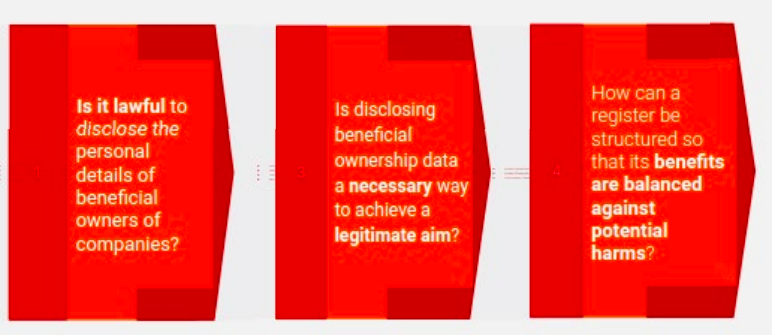Data protection and privacy in beneficial ownership disclosure
I. Introduction: Beneficial Ownership and Privacy
Civil society organizations, civic-minded businesses, and governments across the world are increasingly recognizing the need for greater transparency on the ultimate ownership of corporate entities. However, the move towards collection and publication of beneficial ownership information – particularly in public registers – has also raised criticisms. These include the costs and burden of compliance [5] and uncertainty about what information is needed.
At the same time, some law firms and researchers argue that it is not necessary to publish ownership information in public registers to meet the goal of detecting and deterring illegal activity, or improving the business environment overall. The primary issue they raise is whether the publishing of beneficial ownership information interferes with or threatens individuals’ right to privacy and data protection. This question implies both legal considerations – do beneficial ownership registers contravene or conflict with data protection and privacy laws? – as well as broader questions about the broader impacts of beneficial ownership (BO) registers on privacy.
Publishing the names and ages of companies’ ultimate beneficial owners in public registers raises legal implications, both for the companies holding that information and the public authorities requiring it to be disclosed publicly. This research considers each in turn.
Because the legal issues ultimately derive from individuals’ human right to privacy as to their personal details, this research adopts the typical structure of legal analysis used in human rights law. First, it considers the legality of collection and transmission of ownership information by companies under data protection and beneficial ownership disclosure laws (where they exist). Second, it considers whether disclosure of private information is justified, in the sense that it is a necessary and effective way of achieving a legitimate aim. Finally, it considers whether the impacts of beneficial ownership disclosure are proportionate to the benefits.

More specifically, section one considers the general principles of data protection law and assesses the ways in which companies’ collection and provision of beneficial ownership information can be reconciled with their data protection obligations. Section two sets out the policy case for and against publicly accessible beneficial ownership registers. Section three explores the features required to ensure that the impact of a regime for the disclosure of beneficial ownership information is proportionate to the benefits.

This research is not intended to constitute detailed legal advice on the laws of any jurisdiction. Instead, it gives a general overview of the acceptable features of a lawful framework of beneficial ownership disclosure, which is sensitive to companies’ data protection obligations and governments’ privacy obligations.
At the outset, it is important to recognize that the type of personal information published under beneficial ownership disclosure regimes is typically limited to the identity of a company’s ultimate beneficial owners. The push for disclosure of beneficial ownership of companies is based on a simple proposition: In exchange for having the right to a substantial ownership stake in a company, with all the benefits of protection from personal liability that brings, such an owner should reveal their identity. There is nothing necessary in the structure of a company that requires secrecy as to beneficial ownership, and there are strong arguments in favor of public disclosure.
This paper examines the policy imperatives and implications of beneficial ownership disclosure, and offers questions to consider for advocates, companies working towards increased beneficial ownership transparency, and implementers of beneficial ownership registers, to help them carefully consider privacy-related arguments, mitigate risks where they appear, and strengthen the foundations for responsible disclosure of beneficial ownership data.
Footnotes
[5] See Greenhalgh, H. UK Company Register Criticised as Costly and Bureaucratic,’ Financial Times, 5 April 2016. Available at https://www.ft.com/content/9561cc74-fb2b-11e5-b3f6-11d5706b613b [Accessed September 20 2018].
Next page: II. Is Beneficial Ownership Disclosure in Public Registers Lawful?